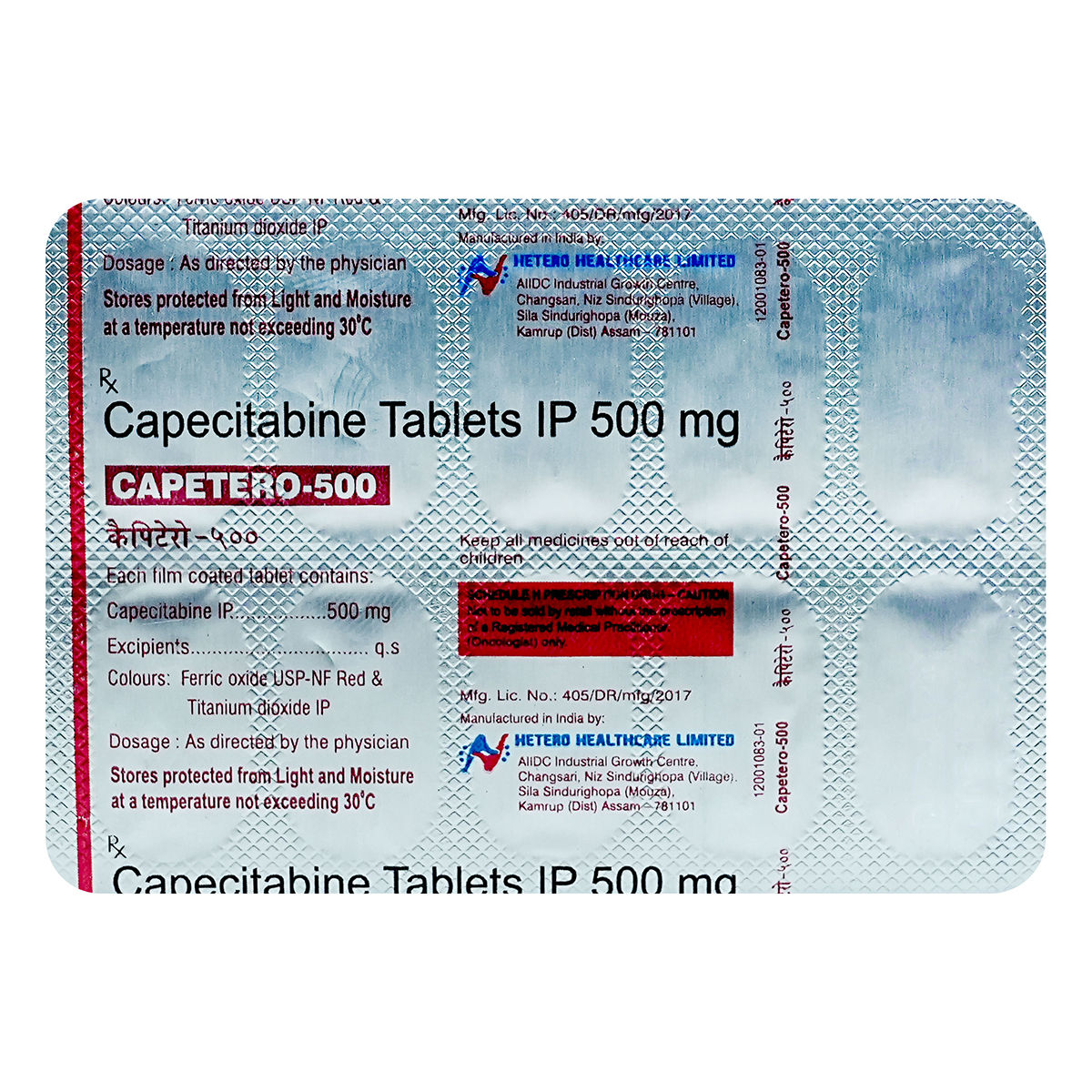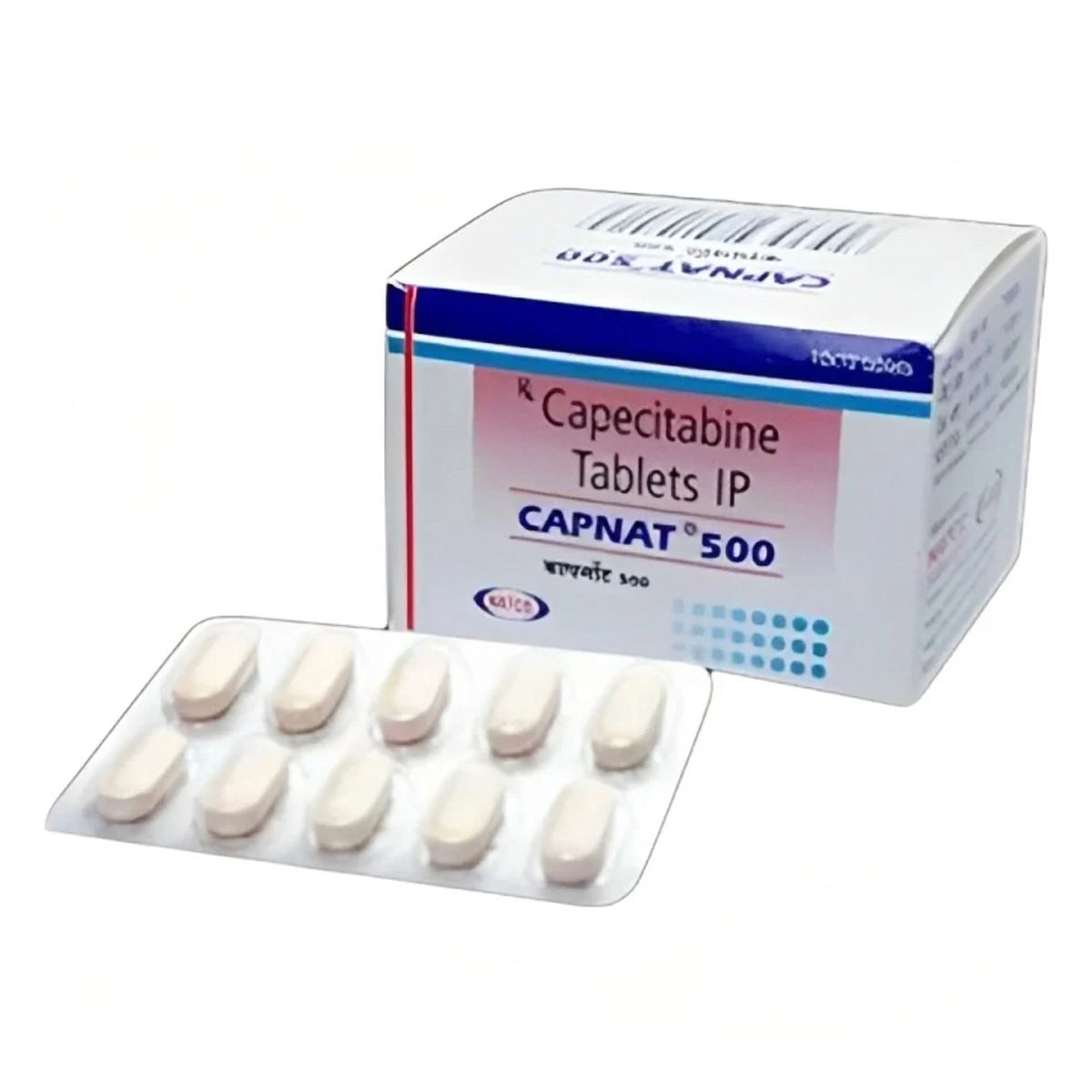Tabine Tablet 10's
₹1068.8*
MRP ₹1125
5% off
₹1068.75*
MRP ₹1125
5% CB
₹56.25 cashback(5%)
Free Delivery
With Circle membership
(Inclusive of all Taxes)
This offer price is valid on orders above ₹800. Apply coupon PHARMA10/PHARMA18 (excluding restricted items)
Know Your Delivery Time
Provide Delivery Location

Whats That

Secure Payment

India's Most Trusted Pharmacy

Genuine Products
Composition :
Manufacturer/Marketer :
Consume Type :
Return Policy :
Expires on or after :
About Tabine Tablet 10's
Tabine Tablet 10's is used to treat breast, colon and stomach cancer. Cancer is a condition where cells in a specific body part grow and reproduce uncontrollably. The cancerous cells can attack and destroy surrounding healthy tissue, including organs. Cancer sometimes begins in one body part before spreading to other areas. This process is known as metastasis.
Tabine Tablet 10's contains Capecitabine, an anti-cancer medication that is cytotoxic (causes cell death). When taken, it gets converted into 5-fluorouracil (chemical), which hampers the synthesis of genetic materials (DNA) in the cancer cells, thereby interfering with their growth. As a result, cancer cells' growth is slowed down and eventually killed.
You may experience certain common side-effects such as nausea, vomiting, weakness, loss of appetite, increased risk of infection, hair loss, diarrhoea, decreased blood cells (red cells, white cells, and platelets), mouth ulcers, blisters on fingers/feet in some cases. Most of these side effects do not require medical attention and will resolve gradually over time. However, you are advised to talk to your doctor if you experience these side effects persistently.
Before taking Tabine Tablet 10's, inform your doctor if you have any infection because Tabine Tablet 10's may worsen the infection. Some patients may experience increased sensitivity to light while taking Tabine Tablet 10's; avoiding prolonged exposure to sunlight is recommended. Inform your doctor if you are pregnant as Tabine Tablet 10's can cause harmful effects on the unborn baby. Both women and men using Tabine Tablet 10's should use birth control to avoid pregnancy. You should not take Tabine Tablet 10's during breastfeeding. Use Tabine Tablet 10's with caution in elderly patients. If you have had leukaemia (blood cancer) and are in remission, do not take live vaccines for three months after your last chemotherapy. You and your surrounding people, such as family members, should not take the polio vaccine.
Uses of Tabine Tablet 10's
Medicinal Benefits
Tabine Tablet 10's belongs to the group of anti-cancer medicines. It contains Capecitabine which is cytotoxic (causes cell death). It is used to treat cancer of the colon, breast and stomach. When taken, it gets converted into 5-fluorouracil (chemical), which hampers the synthesis of genetic materials (DNA) in the cancer cells, thereby interfering with their growth. As a result, the growth of cancer cells is slowed down, and eventually, they are killed.
Side Effects of Tabine Tablet 10's
- Nausea
- Vomiting
- Weakness
- Loss of appetite
- Increased risk of infection
- Hair loss
- Diarrhoea
- Decreased blood cells
- Mouth ulcer
- Blisters on fingers/feet
Directions for Use
Storage
Drug Warnings
Before taking Tabine Tablet 10's, inform your doctor if you have any infection because Tabine Tablet 10's may worsen the infection. If you have any allergy symptoms, talk to your doctor; inform your doctor if you have a metabolic disorder called DPD (dihydropyrimidine dehydrogenase deficiency), heart problems, bone marrow depression, kidney disease, liver disease, and treatment with chemotherapy or radiation. Some patients may experience increased sensitivity to light while taking Tabine Tablet 10's, and avoiding prolonged exposure to sunlight is recommended. Consult your doctor if you are pregnant as Tabine Tablet 10's can cause harmful effects on the unborn baby. Both women and men using Tabine Tablet 10's should use birth control to avoid pregnancy. The use of Tabine Tablet 10's by either parent may result in congenital disabilities. You should not take Tabine Tablet 10's during breastfeeding. Use Tabine Tablet 10's with caution in elderly patients. If you have had leukaemia (blood cancer) and are in remission, do not take live vaccines for three months after your last chemotherapy. You and your surrounding people, such as family members, should not take the polio vaccine. Avoid smoking or going near naked flames as the fabric (bedding, clothing, dressings) in contact with Tabine Tablet 10's catches fire and burns easily. Washing clothing and bedding may reduce product build-up but not remove it.
Therapeutic Class
Drug-Drug Interactions
Drug-Food Interactions
Diet & Lifestyle Advise
Eat a healthy diet and exercise regularly to maintain proper weight.
Avoid smoking and alcohol consumption.
Include leafy vegetables, citrus fruits, fatty fish, berries, yoghurt, apples, peaches, cauliflower, cabbage, broccoli, beans, and herbs.
Avoid fast food, fried food, processed meats, refined carbs and added sugars.
Get optimal sleep; rest well.
Habit Forming
How Tabine Tablet 10's Works
What if I have taken an overdose of Tabine Tablet 10's
Alcohol
Unsafe
You are recommended to avoid alcohol consumption while taking Tabine Tablet 10's to avoid unpleasant side effects. Alcohol intake, along with Tabine Tablet 10's, may cause increased drowsiness.
Pregnancy
Unsafe
Tabine Tablet 10's should not be used during pregnancy because it causes harm to the fetus (newborn baby). Both women of childbearing potential and men must use an effective contraception method while taking fluorouracil and for at least six months afterwards. Please consult your doctor about any concerns regarding this.
Breast Feeding
Unsafe
Tabine Tablet 10's should not be taken during breastfeeding as it passes into the breastmilk and may harm the nursing baby. It is contraindicated in breastfeeding mothers.
Driving
Unsafe
Tabine Tablet 10's may cause dizziness and drowsiness, do not drive or operate heavy machinery if you feel dizzy.
Liver
Caution
If you have had a history or evidence of any liver-related diseases, please consult the doctor before taking Tabine Tablet 10's. Your doctor will weigh the benefits and potential risks before prescribing Tabine Tablet 10's.
Kidney
Caution
If you have had a history or evidence of any kidney-related diseases, please consult the doctor before taking Tabine Tablet 10's. Your doctor will weigh the benefits and potential risks before prescribing Tabine Tablet 10's.
Children
Unsafe
Tabine Tablet 10's should not be used by children, as efficacy and safety have not been established.
Country of origin
Manufacturer/Marketer address
Author Details
We provide you with authentic, trustworthy and relevant information
Tabine Tablet 10's Substitute

Xeloda 500 mg Tablet 10's
₹111.06per tabletCapegard 500 Tablet 10's
₹80.55per tabletCapecite-500 Tablet 8's
₹113.58per tabletCapetero-500 Tablet 10's
₹113.58per tabletCapsy 500 Tablet 10's
₹113.58per tablet
FAQs
Disclaimer
Product Substitutes
Reference
- https://www.accessdata.fda.gov/drugsatfda_docs/label/2015/020896s037lbl.pdf
- https://www.medicines.org.uk/emc/files/pil.11498.pdf
- https://www.macmillan.org.uk/cancer-information-and-support/treatments-and-drugs/capecitabine
- https://www.nhs.uk/conditions/cancer/#:~:text=Cancer%20is%20a%20condition%20where,process%20is%20known%20as%20metastasis.


















